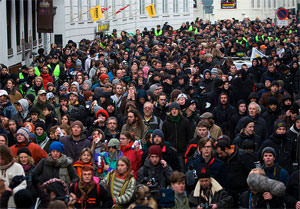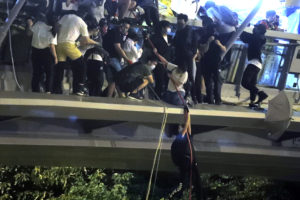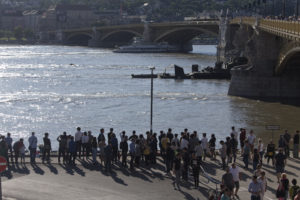Copenhagen Protests Call for Emission Cuts
The Copenhagen climate conference brought not only heads of states to discuss the environment but tens of thousands of demonstrators demanding action by the leaders to cut emissions Later, violence led to arrests Update .
The Copenhagen climate conference brought not only heads of states to discuss the environment but tens of thousands of demonstrators demanding action by the leaders to cut emissions.
Later, police arrested 600 to 700 protesters at demonstrations throughout the city. The New York Times reported that the violence “was a stark counterpoint to the otherwise peaceful march, in which a rolling sea of flags and banners undulated across the city.” Speakers at the protests raised a myriad of issues, including objections to nuclear power and genetically modified food. — JCL
Your support matters…The New York Times:
The police and organizers estimated that 60,000 to 100,000 participants joined a long march from Christiansborg Slotsplads, or Castle Square, southward to the Bella Center, the sprawling and heavily fortified convention center where delegates and observers from nearly 200 nations are gathered to seek a consensus.
The main demonstration — which brought together a broad coalition of hundreds of environmental groups, human rights campaigners, climate activists, anti-capitalists and freelance protesters from dozens of countries — was mostly peaceful.
[…] Most bore slogans related to global warming or urging world leaders to resolve the vast differences that still make an international accord seem elusive as talks here move into the second and final week.
“Bla, Bla, Bla,” read one popular sign. “Act Now!”
Independent journalism is under threat and overshadowed by heavily funded mainstream media.
You can help level the playing field. Become a member.
Your tax-deductible contribution keeps us digging beneath the headlines to give you thought-provoking, investigative reporting and analysis that unearths what's really happening- without compromise.
Give today to support our courageous, independent journalists.



You need to be a supporter to comment.
There are currently no responses to this article.
Be the first to respond.